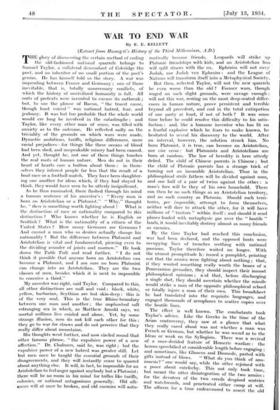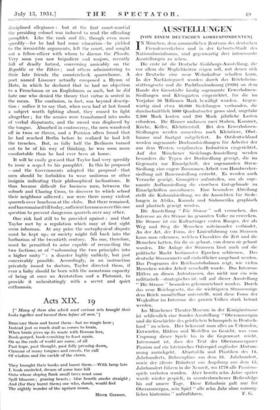WAR TO END WAR
By E. E. KELLETT
(Extract from Hwang-ti's History of the Third Millennium, A.D.) THE glory of discovering the certain method of ending the old-fashioned national quarrels belongs to Samuel Taylor, a collateral descendant of Coleridge the poet, and an inheritor of no small portion of the poet's genius. He has himself told us the story. A war was impending between France and Germany ; one of those inevitable, that is, totally unnecessary conflicts, of which the history of uncivilized humanity is full. All sorts of pretexts were invented to excuse its outbreak ; but, to use the phrase of Bacon, " the truest cause, though least voiced " was national hatred, fear, and jealousy. It was but too probable that the whole world would ere long be involved in the catastrophe ; and Taylor, like every other man of sense, was filled with anxiety as to the outcome. He reflected sadly on the triviality of the grounds on which wars were made. Dynastic ambitions, tariffs, religious differences, mere racial prejudices—for things like these oceans of blood had been shed, and unspeakable misery had been caused. And yet, thought he, not one of these things touches the real roots of human nature. Men do not in their heart of hearts care a button about them : in them- selves they interest people far less that the result of a boat-race or a football match. They have been slaughter- ing one another for ideas which, if they had stayed to think, they would have seen to be utterly insignificant.
As he thus ruminated, there flashed through his mind a famous sentence of his ancestor's : " Every man is born an Aristotelian or a Platonist." " Why," thought he, " there is something worth fighting about ! What is the distinction of race or nationality compared to this distinction ? Who knows whether he is English or Scottish ? What is the nationality of a citizen of the United States ? How many Germans are Germans ? And cannot a man who so desires actually change his nationality ? But the difference between Platonist and Aristotelian is vital and fundamental, piercing even to the dividing asunder of joints and marrow." He took down the Table Talk and read further. " I do not think it possible that anyone born an Aristotelian can become a Platonist, and I am sure no born Platonist can change into an Aristotelian. They are the two classes of men, besides which it is next to impossible to conceive a third."
My ancester was right, said Taylor. Compared to this, all other distinctions are null and void : black, white, yellow, barbarian, Scythian are but skin-deep : this is of the very soul. This is the true Rhine-boundary between one man and another ; the unplumbed salt estranging sea in which, as Matthew Arnold says, we mortal millions live enisled and alone. Yet, by some strange illusion, men do not kill each other for this : they go to war for straws and do not pereeive that they really differ about mountains.
His thoughts went further, and now circled round that other famous phrase, " the expulsive power of a new affection." Dr. Chalmers, said he, was right ; but the expulsive power of a new hatred was greater still. Let but men once be taught the essential grounds of their disagreements, and they will instantly cease to quarrel about anything else. It will, in fact, be impossible for an Aristotelian to feel anger against anybody but a Platonist : there will be no room in his mind for trifles like tariffs, colonies, or national antagonisms generally. Old alli- ances will at once be broken, and Old enemies will auto- matically become friends. Leopards will strike up Platonic friendships with kids, and an Aristotelian lion will split straws with the ox. Ephraim will not envy Judah, nor Judah vex Ephraim : and the League of Nations will transform itself into a Metaphysical Society. But then, reflected Taylor, will not the new quarrels be even worse than the old ? Former wars, though waged on such slight grounds, were savage enough : will not this war, resting on the most deep-seated differ- ences in human nature, prove persistent and terrible beyond all precedent, and end in the total extirpation of one party at least, if not of both ? It was some time before he could resolve this difficulty to his satis- faction : and, like a humane inventor who has lit on a fearful explosive which he fears to make known, he hesitated to reveal his discovery to the world. After an interval, however, the solution struck him. No born Platonist, it is true, can become an Aristotelian, nor vice versa : but Platonists and Aristotelians are born at random. The law of heredity is here utterly defied. The child of Chinese parents is Chinese ; but the child of Platonic parents has a strange trick of turning out an incurable Aristotelian. Thus in the philosophical strife fathers will be divided against sons, and one half of a pair of twins against the other : a man's foes will be they of his own household. There can then be no such things as an Aristotelian territory, and no such country as Platonia. Should such terri- tories, per impossible, attempt to form themselves, neither will dare to attack the other, for it will have millions of " traitors " within itself : and should it send planes loaded with metaphysic gas over the " hostile " lands, it would inevitably destroy almost as many friends as enemies.
By the time Taylor had reached this conclusion, war had been declared, and the opposed hosts were occupying lines of trenches seething with national passions. Taylor therefore waited no longer. With the utmost promptitude h3 issued a pamphlet, pointing out that the armies were fighting about nothing ; that, if they wanted something really worth the bones of a Pomeranian grenadier, they should inspect their inmost philosophical opinions ; aid that, before discharging a single shot, they should ascertain whether the missile would strike a man of the opposite philosophical school or fatally injure a man of their own. This broadsheet he had translated into the requisite languages, and engaged thousands of aeroplanes to scatter copies over the hostile lines.
The effect is well known. The combatants took Taylor's advice. Like the Greeks in the time of the Arian controversy, they saw at a glance that what they really cared about was not whether a man was French or German, but whether he was sound as to the Ideas or weak on the Syllogism. There was a revival of a once-derided feature of Homeric warfare : the heroes speechified at considerable length before engaging ; and sometimes, like Glaucus and Diomede, parted with gifts instead of blows. " What do you thinkf o ana- mnesis?" one would say, while the other rejoined with a poser about entelechy. This not only took time, but meant the utter disintegration of the two armies : for the devotees of the two creeds despised sentries and watchwords, and penetrated either camp at will. The officers for a time endeavoured to assert the old disciplined allegiance : but at the first court-martial the presiding colonel was induced to read the offending pamphlet. Like the rank and file, though even more speedily—for he had had some education—he yielded to the irresistible arguments, left the court, and sought out a fellow-officer with whom to discuss the Phaedo. Very soon you saw brigadiers and majors, recently full of deadly hatred, conversing amicably on the Republic or the Ethics ; and others administering to their late friends the countercheck quarrelsome. A poet named Lissauer actually composed a Hymn of Hate, in which he declared that he had no objection to a Frenchman or an Englishman as such, but he did hate one who denied the theory that virtue is seated in the mean. The confusion, in fact, was beyond descrip- tion : suffice it to say that, when men had at last found a subject worth fighting about, they ceased to fight altogether ; for the armies were transformed into mobs of verbal disputants, and the sword was displaced by the tongue. Absorbed in controversy, the men wandered off in twos or threes, and a Parisian often found that he had reached Berlin before he realized he had left the trenches. But, as fully half the Berliners turned out to be of his way of thinking, he was soon more comfortable than he had ever been at home.
It will be easily gee Ned that Taylor had very speedily to issue a scqu-_-1 to his pamphlet. In this he proposed —and the Governments adopted the proposal—that men should be forbidden to wear uniforms or other insignia indicating their philosophical inclinations. It thus became difficult for business men, between the suburb and Charing Cross, to discover to which school their neighbour adhered ; nor were there many violent quarrels over luncheon at the clubs. But there remained, and has remained till today, sufficient keenness over this one question to prevent dangerous quarrels over any other.
One risk had still to be provided against : and that Taylor met by a regulation which may at first sight seem inhuman. At any price the metaphysical dispute must be kept up; or society might fall back into the barbarism of the twentieth century. No one, therefore, must be permitted to arise capable of reconciling the two factions, or of "subsuming the two principles into a higher unity " : a disaster highly unlikely, but just conceivably possible. Accordingly, in an instruction privately issued to doctors, Taylor directed them, if ever a baby should be born with the monstrous capacity of being at once an Aristotelian and a Platonist, to provide it unhesitatingly with a secret and quiet euthanasia.







































 Previous page
Previous page